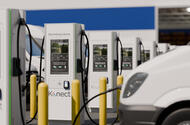Two of the world’s largest EV charging firms are targeting simpler installations, longer uptime and more cost control to help combat the rising prices of electrified car ownership.
This comes as company car drivers face a double whammy of reduced mileage rates and rising home energy prices.
Fleets are a cornerstone of the UK’s plug-in hybrid (PHEV) and electric vehicle (EV) markets, with businesses accounting for more than 80% of new PHEV and EV registrations in 2023.
However, charging costs are an ongoing challenge, and HMRC’s per-mile reimbursement rates have been criticised for not keeping up with fluctuating energy prices.
Petrol and diesel are reimbursed based on the vehicle’s engine size, but there's only one Advisory Electric Rate (AER) for EVs.
Rates are adjusted quarterly, and the AER was cut from 8p to 7p on 1 September – just ahead of Ofgem’s new home energy price cap, which will raise the cost of electricity by almost 10%, to 24.5p per kWh from 1 October.
Drivers plugging in using an Ofgem-capped flat-rate tariff would need to average 3.5mpkWh to break even, including the energy lost during charging.Â
Meanwhile, Zap-Map’s latest data suggests public charging can cost as much as 80p per kWh, or 24p per mile – more than three times the AER.Â
Deepesh Nayanar, head of global fleet e-mobility at Konect (a subsidiary of Gilbarco Veeder-Root, one of the world’s largest supplier of forecourt fuel pumps) believes workplace charging could help fleets manage costs while supporting company car drivers. However, installations remain challenging.Â
“Our customers are coming to us saying electrification is their next big investment, but they need help," Nayanar said. "There’s an eagerness to go electric but they are unclear about how they support and maintain the uptime of charge points on an ongoing basis.â€
Konect provides a turn-key charging solution for electric car fleets, including consultation, project management, in-life maintenance and integration with on-site energy systems from a single supplier.Â
Despite a 22% drop since 2019, commuting and business journeys accounted for a quarter of vehicles’ average annual mileage in 2023, according to the latest National Travel Survey data.Â
Employers can provide free workplace charging without the energy being taxed as a benefit-in-kind, even if the EV is privately owned, the employee is a passenger and it isn’t for a business trip.
Nayanar added: “Poorly managed workplace charging can have a surprisingly negative effect on employee morale. [Businesses] need to provide confidence to their employee base and demonstrate their conviction in the overall move to electrification.â€
Meanwhile, Siemens' Depot360 product is focused on LCV and HGV fleets, enabling operators to outsource design, installation and management of workplace chargers for a monthly fee, removing the need for up-front investment.Â
Bernard Magee, Siemens' managing director of e-mobility, commented: “As well as reducing emissions in their fleet and having the infrastructure in place for customers and clients, [on-site charging] encourages employees to make their own personal switch to EVs.
“But building out this infrastructure can be complex, and it’s this complexity that is holding many businesses back from taking the steps to use technology to become EV-ready.â€

